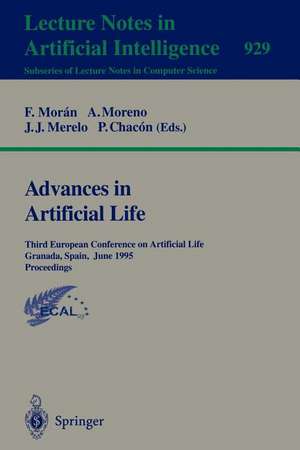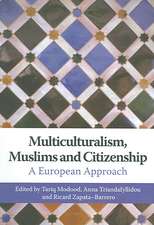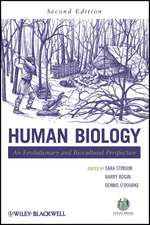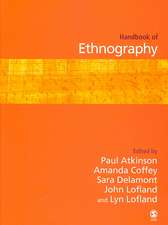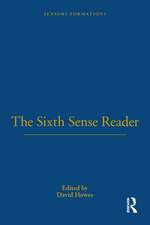Advances in Artificial Life: Third European Conference on Artificial Life, Granada, Spain, June 4 - 6, 1995 Proceedings: Lecture Notes in Computer Science, cartea 929
Editat de Federico Moran, Alvaro Moreno, Juan J. Merelo, Pablo Chaconen Limba Engleză Paperback – 24 mai 1995
Din seria Lecture Notes in Computer Science
- 20%
 Preț: 1061.55 lei
Preț: 1061.55 lei - 20%
 Preț: 307.71 lei
Preț: 307.71 lei - 20%
 Preț: 438.69 lei
Preț: 438.69 lei - 20%
 Preț: 579.30 lei
Preț: 579.30 lei -
 Preț: 410.88 lei
Preț: 410.88 lei - 17%
 Preț: 427.22 lei
Preț: 427.22 lei - 20%
 Preț: 596.46 lei
Preț: 596.46 lei - 15%
 Preț: 448.04 lei
Preț: 448.04 lei - 20%
 Preț: 353.50 lei
Preț: 353.50 lei -
 Preț: 389.49 lei
Preț: 389.49 lei - 20%
 Preț: 309.90 lei
Preț: 309.90 lei - 20%
 Preț: 645.28 lei
Preț: 645.28 lei - 20%
 Preț: 763.23 lei
Preț: 763.23 lei - 15%
 Preț: 580.46 lei
Preț: 580.46 lei - 20%
 Preț: 310.28 lei
Preț: 310.28 lei - 20%
 Preț: 655.02 lei
Preț: 655.02 lei - 20%
 Preț: 1183.14 lei
Preț: 1183.14 lei - 20%
 Preț: 340.32 lei
Preț: 340.32 lei -
 Preț: 449.57 lei
Preț: 449.57 lei - 20%
 Preț: 591.51 lei
Preț: 591.51 lei - 18%
 Preț: 938.83 lei
Preț: 938.83 lei - 20%
 Preț: 337.00 lei
Preț: 337.00 lei - 20%
 Preț: 649.50 lei
Preț: 649.50 lei - 20%
 Preț: 607.40 lei
Preț: 607.40 lei - 20%
 Preț: 1414.79 lei
Preț: 1414.79 lei - 20%
 Preț: 1024.44 lei
Preț: 1024.44 lei - 20%
 Preț: 583.40 lei
Preț: 583.40 lei - 20%
 Preț: 453.32 lei
Preț: 453.32 lei - 20%
 Preț: 575.49 lei
Preț: 575.49 lei - 20%
 Preț: 1075.26 lei
Preț: 1075.26 lei - 20%
 Preț: 585.88 lei
Preț: 585.88 lei - 20%
 Preț: 825.93 lei
Preț: 825.93 lei - 17%
 Preț: 360.20 lei
Preț: 360.20 lei - 20%
 Preț: 763.23 lei
Preț: 763.23 lei - 20%
 Preț: 340.32 lei
Preț: 340.32 lei - 20%
 Preț: 504.58 lei
Preț: 504.58 lei - 20%
 Preț: 369.13 lei
Preț: 369.13 lei - 20%
 Preț: 580.93 lei
Preț: 580.93 lei - 20%
 Preț: 343.62 lei
Preț: 343.62 lei - 20%
 Preț: 350.21 lei
Preț: 350.21 lei - 20%
 Preț: 583.40 lei
Preț: 583.40 lei - 20%
 Preț: 583.40 lei
Preț: 583.40 lei - 15%
 Preț: 438.59 lei
Preț: 438.59 lei - 20%
 Preț: 341.95 lei
Preț: 341.95 lei - 20%
 Preț: 238.01 lei
Preț: 238.01 lei - 20%
 Preț: 538.30 lei
Preț: 538.30 lei
Preț: 679.13 lei
Preț vechi: 848.91 lei
-20% Nou
Puncte Express: 1019
Preț estimativ în valută:
129.97€ • 135.19$ • 107.30£
129.97€ • 135.19$ • 107.30£
Carte tipărită la comandă
Livrare economică 14-28 aprilie
Preluare comenzi: 021 569.72.76
Specificații
ISBN-13: 9783540594963
ISBN-10: 3540594965
Pagini: 980
Ilustrații: XXVI, 962 p.
Dimensiuni: 155 x 235 x 53 mm
Greutate: 1.34 kg
Ediția:1995
Editura: Springer Berlin, Heidelberg
Colecția Springer
Seriile Lecture Notes in Computer Science, Lecture Notes in Artificial Intelligence
Locul publicării:Berlin, Heidelberg, Germany
ISBN-10: 3540594965
Pagini: 980
Ilustrații: XXVI, 962 p.
Dimensiuni: 155 x 235 x 53 mm
Greutate: 1.34 kg
Ediția:1995
Editura: Springer Berlin, Heidelberg
Colecția Springer
Seriile Lecture Notes in Computer Science, Lecture Notes in Artificial Intelligence
Locul publicării:Berlin, Heidelberg, Germany
Public țintă
ResearchCuprins
Artificial life and molecular evolutionary biology.- Artificial life needs a real epistemology.- Grounding and the entailment structure in robots and artificial life.- Mean field theory of the Edge of Chaos.- Escaping from the Cartesian mind-set: Heidegger and artificial life.- Semantic Closure: A guiding notion to ground artificial life.- The inside and outside views of life.- Prebiotic chemistry, artificial life, and complexity theory: What do they tell us about the origin of biological systems?.- Compartimentation in replicator models.- Evolutionary dynamics and optimization.- Population evolution in a single peak fitness landscape how high are the clouds?.- Replicators don't!.- RNA viruses: a bridge between life and artificial life.- Complexity analysis of a self-organizing vs. a template-directed system.- Tile Automaton for evolution of metabolism.- Tracking the red queen: Measurements of adaptive progress in co-evolutionary simulations.- The coevolution of mutation rates.- Coevolution of machines and tapes.- Incremental co-evolution of organisms: A new approach for optimization and discovery of strategies.- Symbiosis and co-evolution in animats.- Artificial endosymbiosis.- Mathematical analysis of evolutionary process.- The evolution of hierarchical representations.- Adaptation and the modular design of organisms.- A theory of differentiation with dynamic clustering.- Cell differentiation and neurogenesis in evolutionary large scale chaos.- Evolving artificial neural networks that develop in time.- Contextual genetic algorithms: Evolving developmental rules.- Can development be designed? What we may learn from the Cog Project.- Emergent organization of interspecies communication in Q-learning artificial organisms.- Self and nonseld revisited: Lessons from modelling the immune network.- On formation of structures.- Learning in the active mode.- Learning subjective “cognitive maps” in the presence of sensory-motor errors.- Specialization under social conditions in shared environments.- Iterated prisoner's dilemma with choice and refusal of partners: Evolutionary results.- Abundance-distributions in artificial life and stochastic models: “age and area” revisited.- Elements of a theory of simulation.- To simulate or not to simulate: A problem of minimising functional logical depth.- Quasi-Uniform Computation-Universal cellular automata.- A new self-reproducing cellular automaton capable of construction and computation.- Self-inspection based reproduction in cellular automata.- Evaluation of learning performance of situated embodied agents.- Seeing in the dark with artificial bats.- Navigating with an adaptive light compass.- Collision avoidance using an egocentric memory of proximity.- A useful autonomous vehicle with a hierarchical behavior control.- Evolving electronic robot controllers that exploit hardware resources.- Classification as sensory-motor coordination.- High-pass filtered positive feedback for decentralized control of cooperation.- Learning and adaptivity: Enhancing reactive behaviour architectures in real-world interaction systems.- Interactivism: A functional model of representation for behavior-based systems.- Noise and the reality gap: The use of simulation in evolutionary robotics.- Essential dynamical structure in learnable autonomous robots.- Optimizing the performance of a robot society in structured environment through Genetic Algorithms.- Spatial games and evolution of cooperation.- Aggressive signaling meets adaptive receiving: Further experiments in synthetic behavioural ecology.- Modellingforaging behaviour of ant colonies.- The computationally complete ant colony: Global coordination in a system with no hierarchy.- Mimicry and coevolution of hedonic agents.- Evolution of symbolic grammar systems.- Driven cellular automata, adaptation and the binding problem.- The functional composition of living machines as a design principle for artificial organisms.- Thermodynamics of RNA folding. When is an RNA molecule in equilibrium?.- An artificial life model for predicting the tertiary structure of unknown proteins that emulates the folding process.- Energy cost evaluation of computing capabilities in biomolecular and artificial matter.- Contemporary evolution strategies.- The usefulness of recombination.- The investigation of Lamarckian Inheritance with Classifier Systems in a massively parallel simulation environment.- Orgy in the computer: Multi-parent reproduction in genetic algorithms.- A simplification of the theory of neural groups selection for adaptive control.
